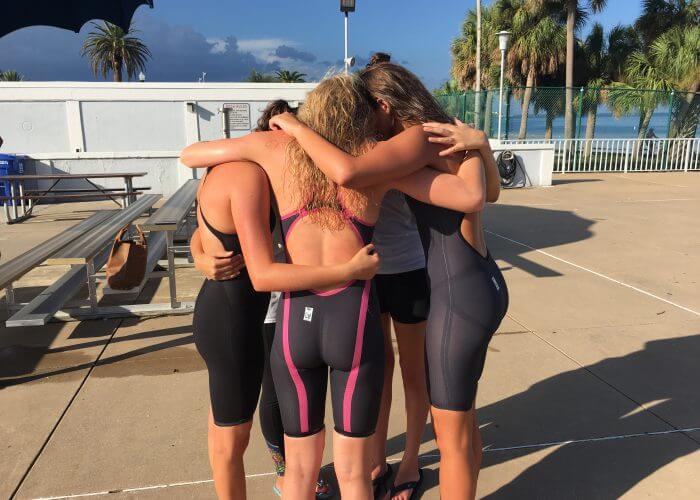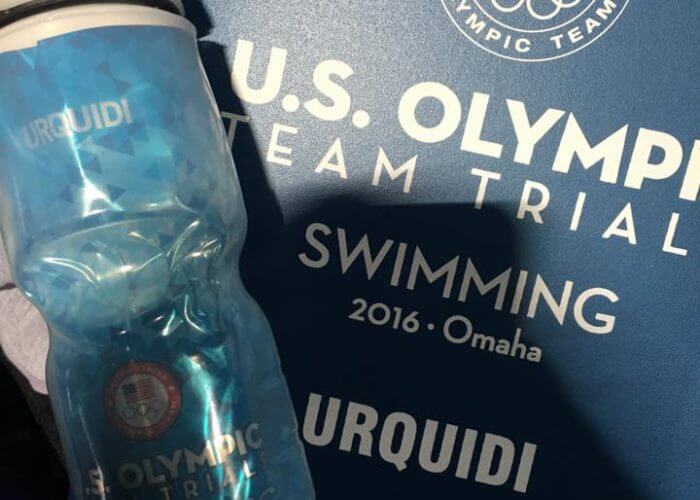Be Sure! 7 Things to Consider Before Ending Swimming Career

7 Things to Consider Before Quitting Swimming
By Niki Urquidi
Many swimmers consider quitting at one time or another due to the intense demands of the sport. Waking up at 5 a.m. to be pushed to the limits day in and day out takes a toll on anyone’s psyche. Yet most swimmers only make empty threats rather than walk out on the sport that formed most of their identities.
Take some advice from someone who actually followed through and hung up her goggles at one point. Please fully consider the weight of your decision. Swimming teaches you so much about yourself and may play a larger role in your life than imagined. To the young athlete on the precipice of walking away, consider these seven things before quitting swimming. And remember, Masters is always an option!
1. Time

Photo Courtesy: Niki Urquidi
One of the biggest drives toward quitting swimming is the feeling that you will suddenly have so much time to study, hang out with friends, travel, draw – you name it. Many truly believe that they would dedicate more time to their studies and earning better grades, but I’m here to tell you that time can be a bully. It will make you feel confident and carefree at first, then suddenly and without warning, it will turn on you.
Two hours in the pool feels exactly like what it is: two hours. But two hours of binge-watching The Office on Netflix goes by in what feels like ten minutes, and suddenly it is midnight and your homework is still left untouched. Time doesn’t stop for you to take a nap, go on Facebook or sleep in.
Soon, you’ll find that instead of using time to your advantage, you can’t help but waste it. Before quitting, consider putting some time management strategies in place and a replacement activity to kick-start your motivation.
2. Mood
As a swimmer, you are taking part in arguably the hardest sport on Earth. That makes you among the most elite, hard-working athletes the world has to offer. With all of this hard work, your body has grown accustomed to having a surplus of endorphins.
Endorphins are a group of natural hormones that activate opioid receptors in your brain to reduce pain and elevate mood. They are most efficiently released through exercise, so adapting to “swammer” life’s lack of intense exercise can be tough. There are very few forms of exercise that amount to the work out swimming provides; consider whether you are mentally and emotionally prepared to take on the challenge of staying positive while your brain chemicals may be acting against you.
3. Diet
Nutritional intake is one of the most obvious changes that a quitting swimmer can expect. Many swimmers and athletes in general focus on protein and carbohydrate intake for muscle building and performance; however, an ex-athlete may tend to over-consume these macronutrients, causing sluggishness and weight gain.
Without the calorie expenditure of swim practice, your body will be prone to changes that will require increased attention to proper fueling. You are already subjecting your brain to a lack of endorphins, and a poor diet can compound these issues. Talk to nutritionists to develop a post swimming plan. Quitting swimming is not a one-and-done kind of decision; rather, it’s an entire lifestyle change.
4. Team/Friendships

Photo Courtesy: Samm Rosenberg
There are no closer friends than teammates. They are the first people you see for morning practice and the last you say good-bye to at the end of the day. They’re with you for the fun sprint sets as well as the mentally challenging distance practices. But often times, quitting swimming can put a strain on these relationships.
Even if you all agree to stay in touch, you are now on very different schedules and it is easy to feel left out or isolated. You can take precautions to maintain relationships, but one of the best ways to prepare for this is to understand that your teammates are not intentionally losing touch or excluding you in any way. They’re just busy! Ask yourself: Are you ready to potentially lose these important people?
5. Doubt/Regret
No matter how sure you may feel in your decision to step away from the sport, it is difficult to meet a person who has not faced feelings of doubt or regret. Whether from idle time, poor mood, or loss of friendships, doubtful moments will come. The creeping questions of, “wait – did I make the right decision?” are virtually unavoidable and discouraging. Before quitting, really consider the most important parts of swimming that may haunt you in your post-swimming life. Are you ready to let those elements go?
6. Independence

Photo Courtesy: Lisa Minnis
You may not realize it, but the swimming world is like a bubble. Once inside that bubble, so many resources and tools lie at your disposal. Colleges dedicate countless resources to enhance student athletes’ physical, emotional, nutritional, and academic lives. Upon leaving the bubble, you will be faced with a lot more responsibilities apart from a strong support system. Ensure that you are ready to take on these added tasks to your already changing lifestyle.
7. Identity

Photo Courtesy:Niki Urquidi
B.J. Neblett coined the expression, “We are the sum total of our experiences.” Our identities, with all their little nuances, are largely influenced by the sports to which we have dedicated so much time, energy and emotion – swimming. The weight of losing this massive part of your identity can take a toll on your self confidence and relationships.
After quitting swimming, I suddenly felt unsure of who I was without the sport. Friends, family, classmates, teachers – everyone I knew – saw me as a swimmer. Our conversations often began with, “So how’s swimming?”
Before you quit, ask yourself how important swimming is to your identity and confidence. We are all so much more than just swimmers, but that does not mean that the part of ourselves forged by this sport can be overlooked or taken for granted.
Explore every avenue of doubt and uncertainty that cross your mind, and really listen to what your closest people have to say. Most importantly, communicate. You may feel that you are the only athlete experiencing this inner conflict, but know that you are not alone. Voice your doubts, speak your regrets, and talk through your decisions; no tool is more powerful than your own voice.
All commentaries are the opinion of the author and do not necessarily reflect the views of Swimming World Magazine nor its staff.




Ashleigh Botha
Frédérique Morin
Andie Quirke you’re not gojng to quit anytime soon but wow just tagging you in this Cz this is exactly how I felt
Zoe Goss
Reese Thompson
No friends?
Danielle Armstrong
??
Shane Donohue
Take it from someone who went through with it, as well – worst decision of my life. Has taken me many years, almost a decade and a half to get over it. Living every day in the “what could have been / what should have been”. This article is spot on in every way.
Charlie Hopkin
Lucas Jensen
Gider ikke læse
I HAVE A GREAT POTENTIAL IN MYSELF AND I KNOW IT.
I HAVE NO ONE TO TRAIN ME THOUGH MY FATHER IS AN INTERNATIONAL SWIMMER , HE IS BUSY WITH HIS WORK IN ANOTHER PLACE.
NO TEAMMATES.SO I GOT TO TRAIN MYSELF WITH MY OWN KNOWLEDGE AND ALONE. CRUTIAL PART IS THAT I GET SO DEMOTIVATED ALWays.
I FEEL LIKE QUITTING.
Giovani Villaseñor
Great article Niki!! Proud of ya!
If I could go back, I wouldn’t have quit swimming.
Coach will not take you back your Senior year after you left the guys after not telling them you were quitting on them two years prior!
Yea. I regret quitting. But I quit not because I want to, I quit because my parents wants me to. Maybe because they want me to focus more on studying for college. However, the author was right. You’ll get fat after you quit. ? I miss those competition I’ve been through— Nationals, Regionals,etc. Believe me, it’s like losing a lover if you quit.
Some sound advice, thank you!
me myself and I. I’m quitting it makes my mental health corrode and that’s not what I need for my freshman year
Hi, im going into freshman year and im planning on trying out for the swim team. Im still not good and practicing one on one with a guy that was on the team feels like torture. Im seriously considering quitting it feels like way to much and i dont think i can handle it. Did you end up quitting? If so do you regret it or potentially have any advice that might help me?